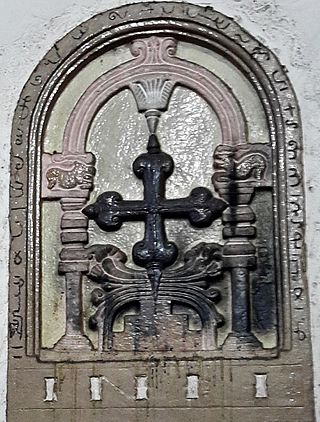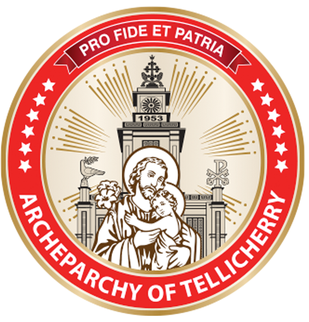
James Mill was a Scottish historian, economist, political theorist and philosopher. He is counted among the founders of the Ricardian school of economics. He also wrote The History of British India (1817) and was one of the prominent historians to take a colonial approach. He was the first writer to divide Indian history into three parts: Hindu, Muslim and British, a classification which has proved surpassingly influential in the field of Indian historical studies.

A clergy house is the residence, or former residence, of one or more priests or ministers of a given religion. Residences of this type can have a variety of names, such as manse, parsonage, rectory, or vicarage.

The Malankara Metropolitan or the Metropolitan of Malabar is an ecclesiastical title given to the head of the Malankara Orthodox Syrian Church. It evolved from the title of the sixteenth century East Syriac metropolitans of India who were also styled the Metropolitan of Malabar. Since the division among the Saint Thomas Christians following the Synod of Diamper, the title has been mostly employed in association with the West Syriac branch of the community, usually known as the Malankara Church, among whom the office of the Malankara Metropolitan became the continuation of the local dynastic Archdeaconate.

Claudius Buchanan FRSE was a Scottish theologian, an ordained minister of the Church of England, and an evangelical missionary for the Church Missionary Society. He served as Vice Provost of the College of Calcutta in India.

The Government of India Act 1935 was an act passed by the British Parliament that originally received royal assent in August 1935. It was the longest act that the British Parliament ever enacted until the Greater London Authority Act 1999 surpassed it. Because of its length, the act was retroactively split by the Government of India (Reprinting) Act 1935 into two separate acts:

The Chaldean Syrian Church of India is an Eastern Christian denomination, based in Thrissur, in India. It is organized as a metropolitan province of the Assyrian Church of the East, and represents traditional Christian communities of the East Syriac Rite along the Malabar Coast of India. It is headed by Mar Awgin Kuriakose.

The Archeparchy of Tellicherry is a Syro-Malabar Church ecclesiastical jurisdiction or archeparchy of the Catholic Church in India. The boundaries of the Thalassery ecclesiastical province were extended to include Mangalore, Chickmangalore, Mysore, Shimoga and Ootty as there were settlers in the neighbouring States. The diocese covers an area of 18,000 km² and a Catholic population of 273,826. Since 2022, Joseph Pamplany is the Metropolitan Archbishop.
India is a country in South Asia.

The Royal Indian Navy mutiny or revolt, also called the 1946 Naval Uprising, is a failed insurrection of Indian naval ratings, soldiers, police personnel and civilians against the British government in India. From the initial flashpoint in Bombay, the revolt spread and found support throughout British India, from Karachi to Calcutta, and ultimately came to involve over 10,000 sailors in 56 ships and shore establishments. The mutiny failed to turn into a revolution because sailors were asked to surrender after the British authorities had assembled superior forces to suppress the mutiny.

Events from the year 1822 in Ireland.
The Diocese of Yangon is the Church of the Province of Myanmar (Anglican) jurisdiction in and around the old capital Yangon, and under the care of the Bishop of Yangon and Archbishop of Myanmar. The diocese was in the Church of England province of Calcutta from 1877 to 1930, then the Church of India, Pakistan, Burma and Ceylon until 1970. Beforehand, British Burma, had come under the guidance of the Bishop of Calcutta, Metropolitan of India. In 1966, the last non-Burmese bishop was evicted by the Burmese authorities and in 1970 the Diocese of Rangoon became the Church of the Province of Burma, and the bishop was elevated to Archbishop in that church.
Catholicos of the East is the title that has been held by the ecclesiastical heads of the Church of the East, the Grand Metropolitan of Seleucia-Ctesiphon, since AD. 280.
Allan Becher Webb was the second Anglican Bishop of Bloemfontein, afterward Bishop of Grahamstown and, later, Dean of Salisbury.

St. Mary's Co-Cathedral is a Catholic church in Armenian Street, Chennai, India. Constructed by Capuchins in 1658, it is one of the oldest churches in the former British India. For a long time Cathedral of the diocese it received the title of co-cathedral when the seat of the Roman Catholic Archdiocese of Madras and Mylapore was transferred to San Thome Basilica.
The Indian Ecclesiastical Establishment was created in 1813 to provide Anglican priests for that part of the British Empire. It initially operated under the auspices of the East India Company The Sees of Madras and Bombay were added to that of Calcutta in 1833. Later they became employees of the Governments of the Presidencies of Bengal, Madras and Bombay. It was abolished in 1948.
The Ven. Basil Stratton was Archdeacon of Lichfield and Canon Treasurer of Lichfield Cathedral from 1959 to 1974.

The Eparchy of Great Britain is the sole Syro-Malabar Catholic Church ecclesiastical territory or eparchy of the Catholic Church in Great Britain. Its cathedral is Syro-Malabar Cathedral of St Alphonsa in the episcopal see of Preston, Lancashire. This eparchy is exempt, that is, not part of any ecclesiastical province in the Latin Catholic Church, but immediately subject to the Major Archbishop of the Syro-Malabar Church, under the supervision of the Congregation for the Oriental Churches. It has jurisdiction over Syro-Malabar Catholics in the entirety of Great Britain: England, Scotland and Wales. Most of the faithful of this eparchy are British Indians with heritage in Kerala, where the Syro-Malabar Church is historically based.










